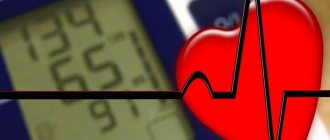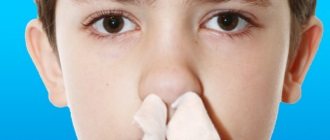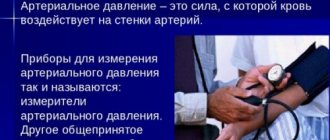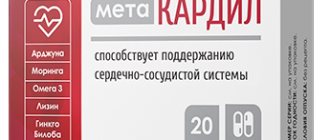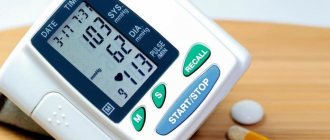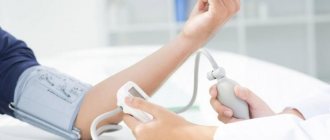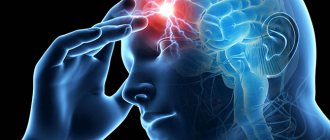Pulse rate is an important indicator that can tell a lot about a person’s health and condition. If even at rest the heart beats very quickly, it means that it is trying to “tell” about some problems in the body.
In general, the lower your heart rate, the better your health. This means that the heart contracts normally and pumps out enough blood to supply all organs. And if the pulse is too fast, it means that the heart is not doing its job very well and is trying to compensate for this. The normal heart rate for an adult is between 60 and 100 per minute. It is more common in children - there are different norms for each age group.
What does heart rate depend on and how to measure it correctly
The heart of a healthy person works like a clock, but, unlike the movement of the second hand, the frequency of its contractions either slows down or speeds up. This is influenced by many factors:
- physical exercise;
- Body temperature;
- stress, intense joy, excitement;
- dehydration;
- drinking drinks that contain alcohol and caffeine;
- smoking;
- taking certain medications.
So how do you know what your “real” heart rate is?
To do this, you need to measure it at rest, and before doing so, do not take alcohol, caffeine, take any medications, or smoke. The best time is immediately after waking up, while you are still in bed. It is most convenient to feel the pulse on the radial artery. Place your thumb on the inside of your wrist and your index finger on the outside of your wrist, under your thumb. To accurately determine your pulse, you need to use a stopwatch. You may come across recommendations that require taking measurements for 15 or 30 seconds, and then multiplying by four or two, respectively. But it’s better to spend a minute - it will be more accurate.
It is also important to remember that each person’s heart rate is individual, and it is also influenced by body size and age. Also, heart rates tend to be low in well-trained athletes.
Shall we dance?
And what to do in those cases when the pressure does not just jump, but seems to dance around normal values - sometimes falling slightly below the control mark, then rising a little higher. To be treated or not?
At the initial stage of arterial therapy, the following measures have a good effect.
— Diet
The basis of the diet of a “beginner hypertensive patient” is vegetables, fruits and cereals. Low-fat dairy products, fish, lean meat (preferably veal) are allowed. It is necessary to exclude foods that complicate the course of hypertension - difficult to digest, salted, fried, smoked, canned, etc.
An important point is the consumption of salt, which retains fluid in the body and thereby increases blood pressure.
It has been proven that reducing salt intake to 5 g per day (for reference, a full teaspoon of salt is 7 g) reduces blood pressure by 10 mm Hg. Art., which is comparable to the effect of taking medications that lower blood pressure.
Hypertensive menu. Simple foods that lower blood pressure Read more
- Physical exercise
— the same effect (a decrease in blood pressure by 10 mm Hg) is achieved by feasible physical activity. The best type of exercise for the heart is aerobic exercise (running, swimming, dancing). With such exercises, the blood is saturated with oxygen and the condition improves.
— Sufficient sleep
7-8 hours is the minimum night's rest that the heart needs to recover. Frequently recurring sleepless nights are a direct path to persistent hypertension.
— Calm
There are several theories as to what triggers hypertension. Most doctors are inclined to think that chronic stress is the basis of this disease. And the best effect in the initial stages is provided by ways to combat it - psychotherapy, meditation, etc.
Hot towel and vinegar. What folk remedies quickly reduce blood pressure? More details
In what cases should you consult a doctor?
The pulse rate can change in various diseases and pathological conditions:
- respiratory infections, such as pneumonia;
- in general, various infectious diseases that are accompanied by a strong increase in body temperature and dehydration;
- anemia – a decrease in the level of hemoglobin and red blood cells in the blood;
- hypotension – decreased blood pressure;
- diseases of the thyroid gland, which are accompanied by an increase in the level of its hormones - hyperthyroidism;
- cardiovascular diseases, including arrhythmias - heart rhythm disturbances.
In medicine, an increase in heart rate above normal is called tachycardia
. And this is a dangerous condition that you should not try to cope with on your own. If your heart rate constantly exceeds 100 beats per minute at rest, this is definitely a reason to consult a doctor who will prescribe the necessary treatment. Especially if you often feel tired or dizzy. Such symptoms cannot be joked about, because over time, more serious disorders of the cardiovascular system may occur, and there is a risk of thrombosis or even sudden death.
Too low a pulse is also not very good. If your heart rate is consistently less than 60 beats per minute, visit your doctor. This condition may be accompanied by symptoms such as dizziness and shortness of breath.
How to recognize high blood pressure?
High blood pressure or arterial hypertension is considered the most common reason for visiting a cardiologist. According to WHO, it affects 20 to 30% of the world's adult population. With age, the situation only gets worse - more than half of older people over 65 years of age have this disease, and its hemorrhagic complications (stroke, heart attack) often become fatal for a person.
Let's consider the norm and pathological changes, including those that threaten the transition to a hypertensive crisis. Let's touch on the causes, signs and methods of correcting high blood pressure.
WHAT IS HIGH PRESSURE?
High blood pressure (BP) is said to occur when its systolic and diastolic components rise above the physiological threshold.
Normal blood pressure according to WHO:
- systolic (upper) – 120-129 mm Hg. st;
- diastolic (lower) – 80-84 mm Hg. Art.
If, when measuring blood pressure, the upper number is 140 or higher, and the lower number is 90 or higher, then this pressure is considered elevated. It should be understood that systematically recorded high blood pressure is considered a pathology. Episodes of its increase in the morning, during intense physical activity, fear, and stress are natural for the body.
According to medical observations, the following blood pressure levels are considered very dangerous - for the upper 180, for the lower 120. In this case, there is a high probability of developing a hypertensive crisis.
CAUSES OF HIGH PRESSURE
Doctors most often record an increase in blood pressure in people with a hereditary predisposition and/or diseases of other organs and systems (pheochromocytoma, hyperthyroidism, atherosclerosis, diabetes, etc.), leading to the development of hypertension as a symptom.
The mechanism of blood pressure increase is realized in two ways:
- neurogenic – vasoconstriction through the response of the sympathetic nervous system;
- humoral – release of vasopressors (catecholamines, renin-angiotensin, etc.) into the blood.
Also important is the disruption of the depressor system, which is responsible for vasodilation.
At the same time, a number of factors that trigger the process of hemodynamic disturbances have long been identified:
- excess weight;
- little daily activity;
- poor nutrition, including preference for fast food, snacking on carbohydrate foods;
- chronic intoxication caused by smoking, alcohol abuse, drug addiction;
- mental and physical stress;
- lack of sleep;
- hormonal changes during puberty, pregnancy, menopause;
- abuse of salt in the diet;
- elderly age;
- harmful working conditions;
- taking medications that can indirectly affect blood pressure (for example, hormonal contraceptives , appetite suppressants, etc.)
With high blood pressure, it is important to monitor the reduction of the influence of these factors in everyday life, which will help reduce the risk of developing the most threatening complications - stroke and heart attack.
SYMPTOMS AND SIGNS OF HIGH PRESSURE
Many people know that hypertension is often asymptomatic, but this is noted only at the beginning. Constantly high blood pressure over time results in a number of clinical symptoms:
- The first signs: rare headaches, dizziness, fatigue, weakness, nervousness, sleep disturbance;
- As it progresses: headaches in the occipital region, “tingling” in the heart area, the appearance of shortness of breath during light physical activity (walking, for example), a feeling of heartbeat, “spots” before the eyes, visual impairment.
External signs of hypertension in men and women are no different. The difference in symptoms mainly depends on the level of pressure and the rate of its increase. Often a sharp increase in blood pressure threatens the development of a hypertensive crisis and rupture of the vessel wall.
HIGH LOWER PRESSURE: CAUSES, SYMPTOMS
By lower or diastolic pressure we mean the force with which the blood flow acts on the vessels during the diastole (relaxation) phase of the heart. Its value depends on the degree of vascular resistance, an increase in which is observed in the following pathological conditions:
- atherosclerosis - the elasticity of the walls of blood vessels decreases, their lumen decreases, which increases tone and resistance to blood flow;
- kidney pathology leads to vasoconstriction due to the implementation of the renin-angiotensin-aldosterone reaction;
- anatomical and functional changes in the myocardium (dilation of the heart chambers, arrhythmia);
- thyrotoxicosis – a high concentration of thyroid hormones in the blood causes vasospasm;
- diabetes mellitus – vascular patency is impaired;
- tumor of the pituitary gland and adrenal glands - the release of catecholamines into the blood, which constrict blood vessels;
According to statistics, the elderly population and men of any age often suffer from high blood pressure. Signs of its increase are sharp pain in the head, dizziness, tinnitus, and attacks of shortness of breath. Painful discomfort in the cardiac region is possible. Long-term high diastolic pressure threatens the development of a heart attack or stroke.
INCREASED UPPER PRESSURE: CAUSES, SYMPTOMS
Upper (systolic) pressure reflects the contractile activity of the myocardium during systole. Its increase may be due to various reasons:
- congenital defects and acquired cardiac pathology - coarctation of the aorta, PDA, blockade of the atrioventricular node, insufficiency of the valves at the entrance to the aorta;
- ion deviations - accumulation of sodium and calcium in the blood;
- atherosclerosis of large and small vessels;
- renal pathologies of an inflammatory, autoimmune nature;
- diabetes;
- dehydration of the body.
Over time, increased upper pressure first leads to hypertrophy, and then to wear and tear of the myocardium and the formation of heart failure. The aortic wall becomes rigid due to constant trauma by increasing blood pressure. Hemodynamic disturbances of internal organs are also noted due to inadequate distribution of blood through the vessels.
This type of hypertension is more often recorded in women. It manifests itself as regular headaches, discomfort in the heart, fatigue, memory impairment, tinnitus, and decreased vision.
TREATMENT OF HIGH PRESSURE
The main goal of therapy for high blood pressure is to reduce its levels to normal and the maximum possible correction of risk factors (fighting smoking, alcoholism, losing excess weight, doing morning exercises), as well as slowing down the damage to other organs.
Taking into account anamnestic and objective data, various medications are prescribed for hypertension; their main groups are presented below:
- antihypertensive medications to lower blood pressure;
- disaggregants that reduce the risk of hemorrhagic complications;
- statins for correction of lipid metabolism;
- diuretics that indirectly reduce blood pressure;
- according to strict indications, a and/or β-blockers to correct myocardial contractility.
If high blood pressure is a sign of pathology in another organ, then treatment of the underlying disease will be key.
An important aspect in the treatment of high blood pressure is a balanced diet, in which you need to limit salt intake, eat more vegetables, nuts, fruits, healthy vegetable oils (olive, pumpkin). If possible, replace red meat with fish. Reduce the amount of calcium-rich dairy products in your diet.
WHICH DOCTOR SHOULD I CONSULT WITH HIGH PRESSURE?
At the clinic stage, the first doctor who is contacted with symptoms of high blood pressure is a general practitioner. He can prescribe the necessary examination to make a diagnosis and correct high blood pressure readings. A doctor who has deep knowledge of the problem of high blood pressure in humans is a cardiologist. This specialist not only deals with the correction of hypertension, but also fights its complications, often together with a neurologist, nephrologist, ophthalmologist and resuscitator.
PREVENTION
The coherence of the heart and blood vessels is a key link in the health of the whole organism. Thanks to preventive measures, it is possible to maintain their harmony, thereby preventing the development of hypertension. These include:
- a measured lifestyle with adequate physical activity;
- weight loss to normal levels;
- balanced diet;
- quitting smoking, alcohol, drugs.
If the symptoms described above appear, you should begin to systematically measure blood pressure using a tonometer. Regardless of the reasons for high blood pressure, its long-term retention at high levels is a reason to contact a therapist or cardiologist.
Cardiologist Rudnik N.I.
How to lower your heart rate on your own?
So, if you are sure that you are completely healthy, do not need treatment, and want to reduce your heart rate, you can use these tips.
Avoid overheating
When a person is hot, his body must get rid of excess heat. One of the most effective mechanisms is sweating. The skin's sweat glands begin to work actively, and it requires more blood. At the same time, the body loses a lot of fluid. This creates additional stress on the heart, and it is forced to contract more often. This is a normal occurrence during visits to baths and saunas. The problem occurs when overheating becomes constant - for example, in the summer, or if you work in a room with high temperatures. In such cases, it is worth spending more time in the shade or under air conditioning. If that doesn't work, then at least drink more fluids.
Exercise regularly
Lowering your heart rate is just one benefit of regular exercise. They also help generally improve the condition of the cardiovascular system, normalize weight, ensure good health, and even reduce the risk of developing cancer.
And don’t be confused by the fact that the advice from this point seems illogical at first glance. Yes, when you exercise, your heart rate increases. This is a temporary effect. Over time, your heart becomes more trained and can pump blood more and more efficiently. This means he doesn't have to contract as often as before.
Eat more fish
Like physical activity, healthy eating is beneficial in many ways. Fish should be present in every person's diet at least once a week. One of the beneficial effects is a reduction in heart rate and the risk of death from coronary disease, myocardial infarction. This conclusion was reached by scientists from the American Heart Association based on the results of a study published in 2003.
If you do not like fish dishes, you can purchase some kind of dietary supplement with fish oil.
Protect yourself from stress
There are two parts of the autonomic nervous system in the human body. The parasympathetic department predominates in a state of rest - it reduces the frequency and strength of heart contractions. The sympathetic one is activated in a state of stress - it causes an effect that can be figuratively described as “fight or flight.”
Unlike primitive ancestors, the modern average person does not need to run away from anyone or fight with anyone. But stress levels are off the charts, especially in big cities. If you don’t see ways to protect yourself from stressors, you can start small:
- set aside some time every day to turn off your phone, computer, TV and other gadgets;
- practice meditation - just 15 minutes a day is enough to start.
Do breathing practices
The work of the heart and lungs is closely related. Deep, mindful breathing helps quickly reduce stress levels and “calm” the cardiovascular system. Inhale for five seconds and then exhale slowly for 15 seconds. It can be helpful to do a few of these inhalations and exhalations from time to time, especially when you are very nervous. You can also consider breathing practices that are used in yoga - pranayama.
Stop smoking
Smoking is most often talked about as the cause of lung cancer and other cancers. Many manufacturers of smokeless nicotine delivery devices play on this: advertising claims that they are supposedly almost safe. In fact, the main enemy of health is nicotine, and the main blow falls on the cardiovascular system.
After smoking a cigarette (or vaping, hookah, whatever), the lumen of the arteries and veins narrows. As a result, it becomes more difficult for the heart to push blood through, and it begins to contract more often. This happens even at rest.
The good news is that this effect is reversible, and quite quickly. While it takes several years to reduce the risk of developing lung cancer, the pulse returns to normal within 24 hours after the last cigarette smoked. In addition, this way you can lower your blood pressure. Further more: giving up a bad habit will lead to a significant improvement in your health and overall well-being.
Drink enough fluids
When the body loses a lot of fluid, the blood thickens and it becomes more difficult for the heart to pump it. The lack of effort is compensated by an increase in heart rate. Therefore, if you want to slow down your heart rate, you need to hydrate your body regularly. However, it is important not to overdo it, especially for people with high blood pressure, varicose veins and swelling in the legs and other cardiovascular diseases. Try to drink more fluids in the morning and reduce your intake in the evening.
It is important to remember two more recommendations:
- It is better to drink plain water, and certainly not drinks with sugar (sweet tea and sparkling water). Added sugars lead to extra pounds and additional stress on the heart.
- Avoid drinks with alcohol - it thickens the blood.
Limit your caffeine intake
Caffeine itself increases your heart rate. And even if this is a temporary effect, it will become permanent if you are a “coffee addict.” In addition, caffeine acts as a diuretic and promotes fluid loss - and we have already discussed the negative effects of dehydration above.
Maintain a normal weight
Extra pounds are additional fatty tissue through which blood also needs to be pumped, which increases the load on the heart. This effect is especially pronounced if the body has a lot of fat but little muscle mass. In addition, obese people often develop atherosclerosis, which is a difficulty in blood flow through narrowed vessels and increased blood pressure with all the ensuing consequences.
In fact, bringing your body weight back to normal is not that difficult. For most people, following two recommendations is enough:
- Eat right. And here we are not talking about strict, exhausting diets - they will only do harm. You just need to stick to a healthy diet that won't load your body with a lot of fat, fast carbohydrates and calories.
- Play sports. This will help you lose extra calories. After all, the human body was not designed by nature to constantly spend time in an office chair or on the couch in front of the TV. We are not adapted to this way of life.
Get a good night's sleep
A full night's sleep is not just rest. This is one of the important components of the biological clock built into the human body - circadian rhythms. When they are violated, all organs suffer. This occurs with chronic lack of sleep, irregular routine, and night shift work. And one of the negative effects is an increased load on the heart, a malfunction of the cardiovascular system. By the way, taking a nap during the day is also useful, but not for too long. Twenty minutes is enough.
To space or to the hospital
“It is generally accepted that high blood pressure definitely makes itself felt - headaches, tinnitus, heaviness in the back of the head,” says Maria Gavrilova, a general practitioner of the highest category. “However, there are often cases when, even when rising to critical values, high pressure does not manifest itself in any way. Moreover, there are people who feel good (or, as they themselves say, “cheerfully”, “on the rise”) precisely at those moments when the pressure rises. Doctors never tire of repeating that such vigor can be extremely dangerous. A hypertensive crisis is fraught with dangerous complications that can lead to disability or death.”
Article on the topic It is forbidden to make mistakes. How to measure blood pressure correctly Another problem is that many people with hypertension who regularly use a blood pressure monitor consider their blood pressure to be normal.
“It’s no secret that quite recently doctors gave a person with a blood pressure of 140/70 mm Hg. Art. they said: “At least tomorrow you can become an astronaut,” continues Maria Gavrilova.
According to modern ideas,
- pressure 120/80 is considered normal; - blood pressure from 120/80 to 130/80 is considered elevated; - pressure from 130/80 to 139/89 is already stage 1 hypertension, which should be treated.
